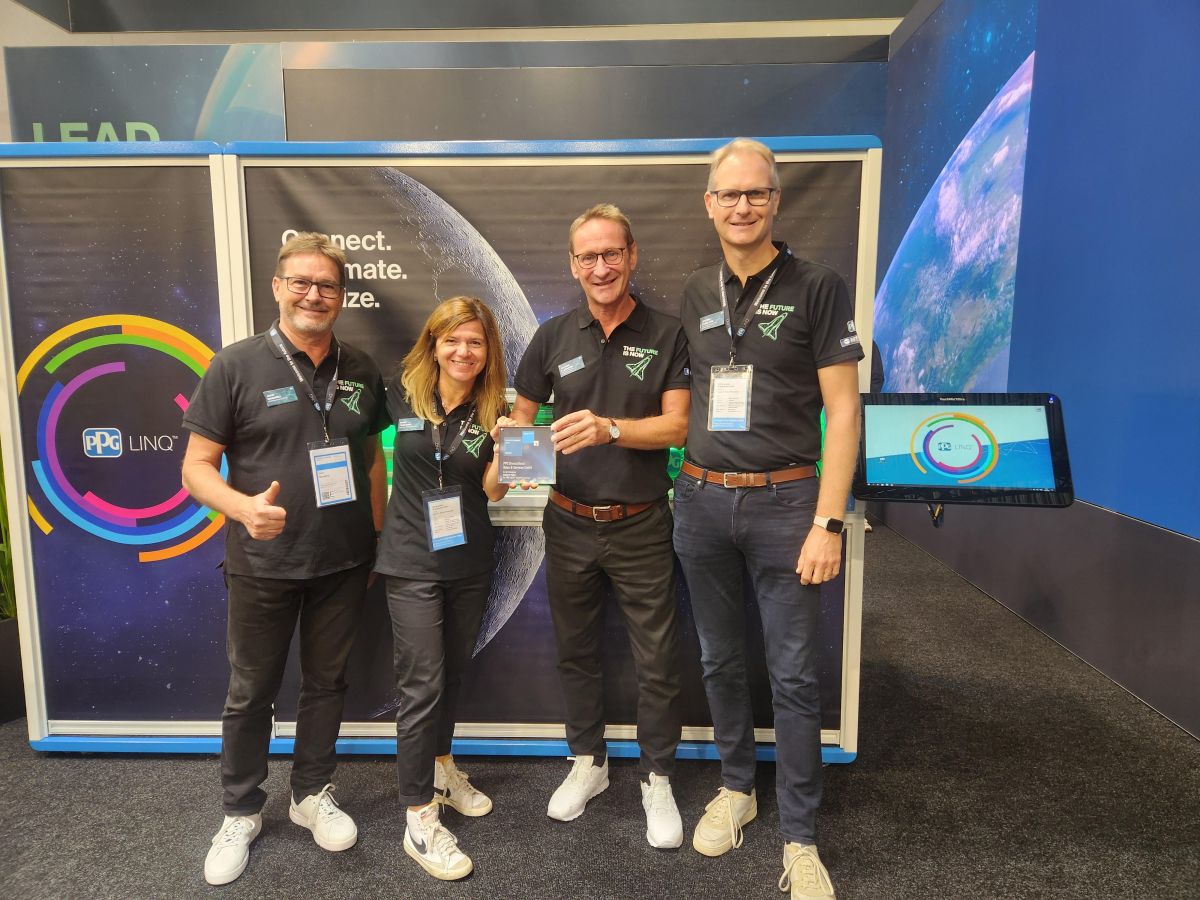PPG received an Innovation Award for the PPG LINQ digital ecosystem during the Automechanika Frankfurt Show in September. The award recognizes outstanding technological developments with significant market relevance in the automotive supplier industry, automotive workshop and services sector, or original equipment manufacturers (OEMs).
“The PPG LINQ digital ecosystem is really a complete digital solution in a market where optimizing the use of materials and efficiency is so important,” said Jason Moseley, a presenting juror at the Automechanika Innovation Awards ceremony. “That is why we have chosen this new system as the winner.”
“We are honored to receive this esteemed award,” said Jerome Zamblera, PPG vice president, Europe, Middle East and Africa, Automotive Refinish. “It is a testament to our commitment to innovation, excellence and sustainability in the refinish industry. The deployment of digital tools allows us to create a better working environment and attract the younger generation to the industry.”
Zamblera said on behalf of the company, he takes pride in the team that worked on the project since its inception.
Introduced a year and a half ago, the PPG LINQ digital ecosystem is available worldwide. It includes the following components: PPG LINQ COLOR™ software, the PPG MAGICBOX™ body shop assistant, PPG VISUALIZID™ software, the PPG DIGIMATCH™ spectrophotometer and PPG MOONWALK®, the company’s award-winning, automated paint mixing system launched in 2019.
Zamblera said the product was created to assist painters in modernizing their repair processes using the cloud-based platform and its interconnected digital hardware, software and innovative services.
“Everything we do in terms of new product development is driven towards providing higher productivity in the shop, reducing the carbon footprint, and making the job more attractive to the young generation,” he said.
Zamblera said PPG LINQ is easy to use, saves labor time, reduces waste and transforms the mixing room into a clean and safe environment.
“Everything that painters have done in an analogic manner, they can now do digitally,” he explained. “A body shop painter will save, on average, between 20 to about 60 minutes on each job when they do color matching.”
The system can automate routine tasks and optimize resource use, which can reduce operational costs for body shops.
In addition, he said using the product reduces material waste, energy consumption and process times, which contributes to meeting sustainability goals.
“Helping to reduce waste is very important,” noted Zamblera. “That’s one of the key attributes of Moonwalk because of its high level of accuracy.”
One way to help reduce shops’ carbon emissions, according to Zamblera, is by changing their habits in the way they process products. For example, PPG’s air-drying technology eliminates the need to put a spray booth in baking mode.
“They can let the product dry at ambient temperature without the need for it to cure, which means they can air dry a primer or a clear coat in 20 to 30 minutes,” he said.
Zamblera said the one common theme across the globe in the industry is the lack of skilled labor.
Automating and digitizing some of the tasks painters have been doing allows others in the shop to help manage the process of color identification, matching and mixing.
He said PPG LINQ can also assist with the recruiting and hiring process by attracting a new generation of employees.
“Leveraging technology demonstrates that a shop painter doesn’t have to work in a dusty, filthy, noisy shop,” he said. “Instead, they can work in a very clean and digitized environment.”
To help collision repair students learn the critical skills they need, PPG’s foundation provides advanced technology and products.
“PPG LINQ includes scalable solutions that can be tailored to various business sizes, making it an indispensable tool for automotive professionals,” he said. “With precise application and monitoring systems, it ensures consistent, high-quality results, reducing the risk of errors and rework.”












